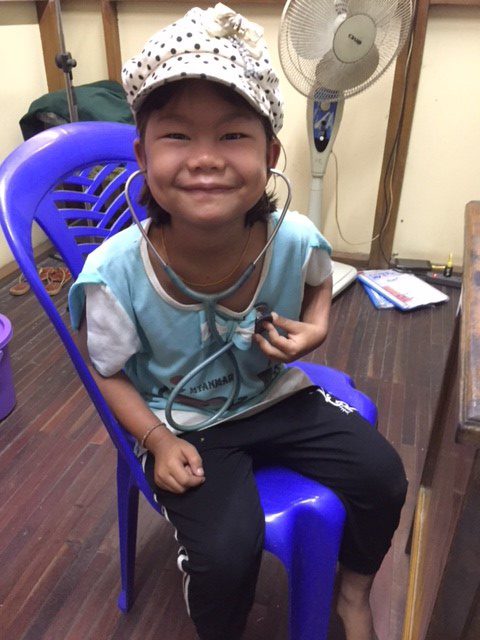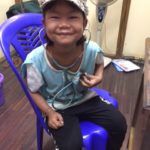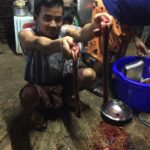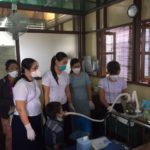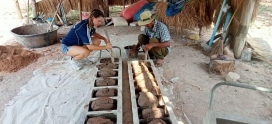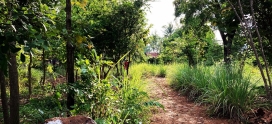Ed Wilkins in Myanmar- Week 33
With thirty-six weeks of my Myanmar odyssey under the belt, herewith is my thirty-third blog: the missing three may wing their way into an e-mail inbox at some point, but then again, they may not! They always say pictures speak louder than words and so I’m kicking off this epistle with exactly that, albeit completely against the grain of past blogs where a touch of self-indulgent overly verbose repartee usually sets me up for the morning and probably gets you down as you heroically prepare yourselves for a 2-minute speed-read of my personal reflections of the week.
And so, the first piccy is one of a cheeky little girl who’s purloined my stethoscope and, simulating my actions exactly, is listening to her own lub-dub mesmerising heart sounds at the same time as playing to the onlooking spectator, which of course is me (Picture 1). However, underlying that winning smile and mischievous look lies a seriously unwell child and yet, typical of the kiddies in this young country, she never changes her happy demeanour as she’s prodded and poked around in my examination.
Luckily, what’s covertly killing her immune system off can be corrected by today’s meds; we just need to get the right ones into her at the right time and that’s a lot easier said than done. But my stint here has seen me resurrect my long since departed
paediatric know-how which has been gathering dust in the recesses of my brain and put it to better use. With infections dominating the kiddywink clinic and over five hundred on the books with HIV, much of the morning’s work is spent assessing the outcome of nature’s germ-warfare with the often-immature immune system and correcting it as best possible. For this process, sometimes too much is more harmful than too little and nowhere is this more evident than in the overuse of antibiotics, an inescapable truth for medicine the world through. So, a super dedicated junior doctor and her pharmacist partner have put together the charity’s – which is Medical Action Myanmar if, just in case, you have unluckily happened across this blog for the very first time: affectionately known as MAM to its inmates – very first personalised antibiotic policy, and after just a few months it is having an impact in that fewer antibiotics are being prescribed and choices are more appropriate, which was the whole aim and can only be good news.
But to quote the much loved but totally irreverent comic show Monty Python, ‘now for something completely different’. No doubt this week’s blog will return to more relevant events but, in the meantime and as an aside, there was another competition for the attention of the ex-pats; the World Cup. The unexpected success of England’s young team captured the imagination for many and, given this opportunity is certainly unlikely to come in my lifetime again, the midweek semi-final was always going to be a not-to-miss event on the calendar. Hence, the early hours of Thursday morning saw a motley crew gathered beers-in-hand around a TV, with quickened pulses and over-hyped expectations, to watch the young braves of England and their waistcoated manager eventually fall to the Croatian foes with their greater experience and wisdom (Picture 2). Yet, hangovers and heartache were soon replaced by the daily ritual of the ride to work the following morning which allows enough time for a power-nap or three before the challenges of the clinic. And, while on the matter of the flat, we now have a full complement of lodgers with the arrival of a very young man to make it a happy trio. Despite no-doubt suffering severe jet-lag, he was immediately initiated by my Dutch flat-mate into the favourite beer houses which go under the names of the ‘white-rabbit’ and the ‘one-eyed cat’ (so called for obvious reasons); he survived to tell the tale and observantly remarked the following day that he was impressed by the Dutchman’s alcohol tolerance and capacity, a fact that is legend in our small circle.
While on this subject, a few days earlier, while imbibing at the one-eyed cat, the cooks were dealing with an unwanted intruder, the wet-season being an irresistible enticement for the slippery serpentines of Yangon to show their fangs which as you know can be a tad harmful to man but also not-so-pleasant an outcome for them as well (Picture 3): this one possibly even made its way onto the ‘specials’ menu for that evening.
Now, to witness the introduction of something that has undergone an elephant-like gestation to come to fruition is super-satisfying. The final enabling persuasive power was not from myself, however, but from the supremo nurse who I praised in last week’s blog and reiterates the message I always make. And that is, it is irrelevant what background you come from, it is the desire to come and help in any way possible that is what is required. So, we can now perform sputum induction in the largest clinic (picture 4) which I’ve been pushing to implement for what seems like an eternity, and I’m sure this will make an enormous difference in the clinic’s ability to more accurately distinguish the ‘TB or not TB’ oft-quoted question. In addition, my mission – which is an educational on-line platform of anything and everything that stimulates the desire to learn from case histories, talks, images, policies, and guidelines – is being added to and developed by both other volunteers and the local MAM doctors. Although light-years behind Facebook and Twitter for ‘in-clinic’ diversion, it is certainly receiving many more ‘hits’ and being used regularly by many doctors and occasionally by some (and of course, inevitable never by others!) and one can only hope that it will become established as a source to help and to stimulate in the acquisition of knowledge, which I’ve always believed is the key to unlock the fun of medicine and by-the-by, significantly improve the quality of care in clinics. So, we are just short of 200 documents now with plans afoot for many more. One of the additional folders added to this site which reflects the energy and input of an awesome academic clinician specialising in infections is one for research, here shown with some of her research team (Picture 5). Despite the challenges of conducting research in this country, which require an indefatigable spirit, a saintly disposition, rhinoceros-thick skin, and an ability to patiently await the outcome of numerous governmental prevarications, the rewards are potentially high because of the enormous number of unanswered medical questions that exist. In this regard, she has managed where others have failed and has also organised the other volunteers to think about projects and audits that they can completed in their time here and which hopefully are the catalyst to set them on the road to a more enquiring medical mind for the future.
Last, but not least, my hometown should have prepared me for the weather here given the city’s infamous appellation of ‘it always rains in Manchester’. But the inclement Burmese rainy season gets you down both literally, as with complete sobriety and much inelegance I’ve fallen flat on my back twice now because of my instability on slippery surfaces, as well as metaphorically, because we’re all a bit down-hearted as despite umbrellas and waterproofs we get hose-piped down with a significant part of the Indian ocean daily (Picture 6). However, the knowledge that it will end in 6-8 weeks and be followed by relentless sun gives a definite boost to collective morale. Upping this a level to a more relevant issue amongst the Burmese, suicide is not uncommon amongst the populace, most being farmers with small holdings who in their attempt to escape the debt cycle are preyed on by loan sharks with exorbitant interest rate demands. Burdened with crushing debt, often suicide is seen as a way of escaping an inextricable situation, no different than anywhere else in the world. But, depression is now being recognised as an important illness and not family embarrassment to be hidden and men are more open about their feelings which can only be good. Interestingly, Buddhist devotees believe that if one commits suicide, he or she will commit suicide again for the next 500 lives: a definite further disincentive if one needed one.
And I will finish this blog as I hear the rain stepping up its intensity outside with a memory from my teenage years; Jose Feliciano’s song which launched his career: ‘Listen to the pouring rain, listen to it pour; and with every drop of rain, you know I love you more’ – pity about the last line.

